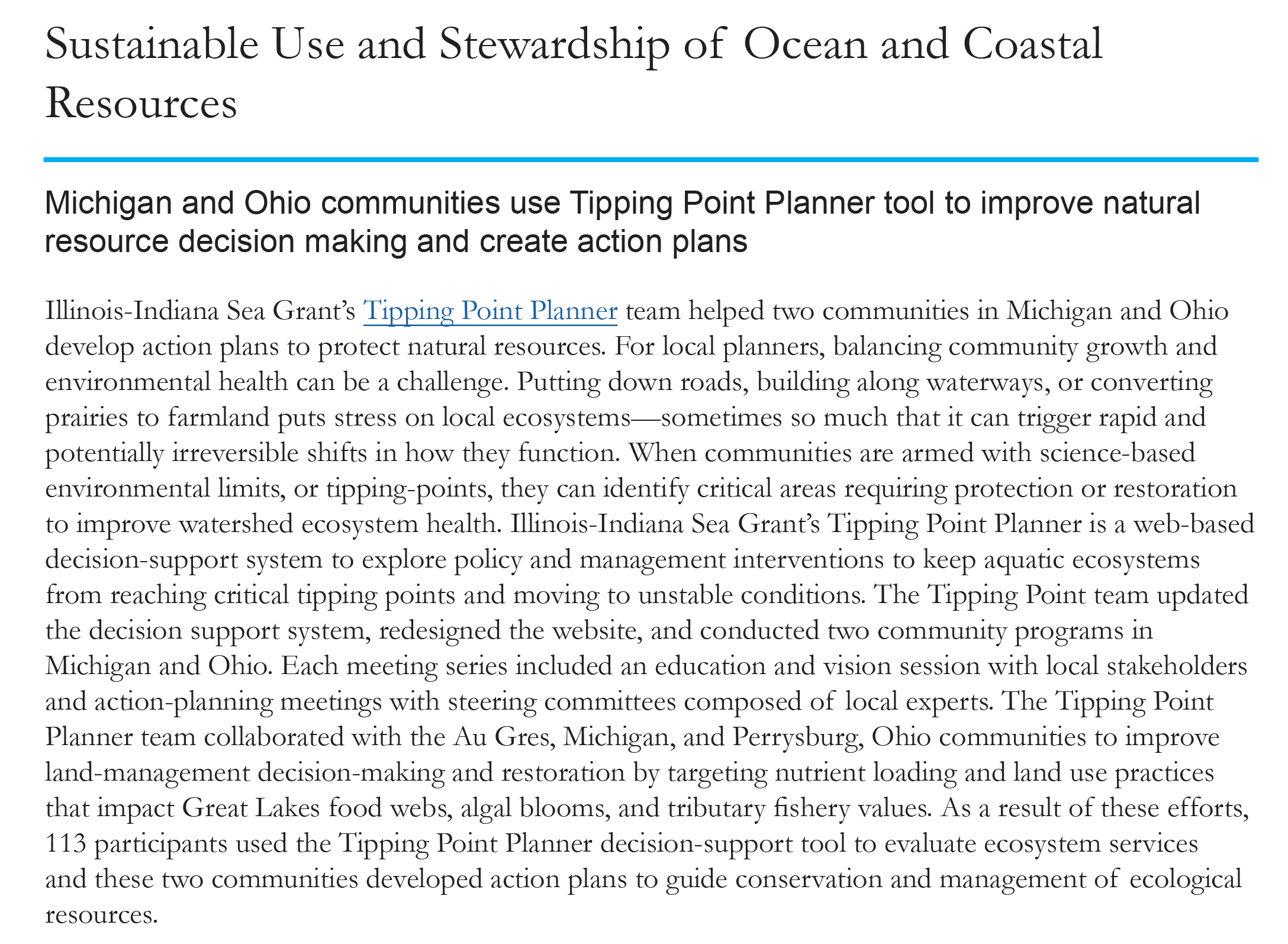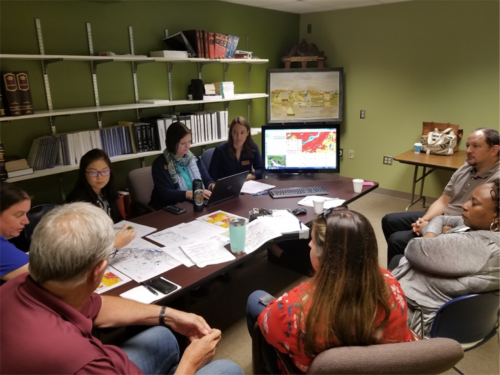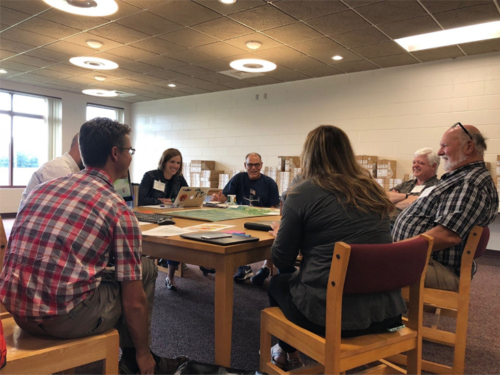 Purdue University - Extension - Forestry and Natural Resources
Purdue University - Extension - Forestry and Natural Resources
Got Nature? Blog
The Tipping Point Planner project, a joint effort by Illinois-Indiana Sea Grant and Purdue Extension, was recognized in the National Oceanic and Atmospheric Administration’s (NOAA) 2019 Science Report (PDF, 13MB) for its accomplishments last year.
The report, which “provides a snapshot of many of the research accomplishments of NOAA and its academic and industry partners”, was broken down into three main areas: reducing societal impacts from hazardous weather and other environmental phenomena; enabling the sustainable use and stewardship of ocean and coastal resources; and advancing a robust and effective research, development and transition enterprise. The Tipping Point Planner was mentioned in the Sustainable Use and Stewardship of Ocean and Coastal Resources segment.
The Tipping Point Planner was created to assist community leaders throughout the Great Lakes Basin in making long-term management decisions that affect environmental health of local resources and a community’s quality of life. The program, which includes a web-based decision support system, helps identify the status of watershed health by exploring land use, natural resources and environmental concerns, before determining the impacts of land-use decisions and management practices and, in turn, enables communities keep coastal ecosystems from reaching critical environmental limits, or tipping points, and becoming unstable.
In 2019, the Tipping Point Planner team worked with communities in Au Gres, Michigan; and Perrysburg, Ohio, to create action plans regarding conservation and ecological resource management. All told, more than 100 people in these areas utilized the Tipping Point Planner and collaborated in making the community decisions.
“This project challenges the research community because we have had to completely reorient the way that we analyze our data,” said Dr. Bryan Pijanowski, professor of landscape and soundscape ecology. “We have had to be more creative and imaginative than ever before. It challenges the way we think about our long-held theories in science, too. And this is only possible if research, university engagement and communities work closely together to solve problems. I’m convinced that high impact solutions can come from close partnerships like this.”
Pijanowski; Kara Salazar, assistant program leader and extension specialist for sustainable communities; Lydia Utley, data analyst; and Daniel Walker, community planning extension specialist, are the project leaders for the Tipping Point Planner. View the full Tipping Point Planning team.
The featured segment on the Tipping Point Planning program from the NOAA annual science report is below.

Resources
The Tipping Point Planner project
With GIS, Communities See How Land-Use Changes May Affect Local Water Quality, Environmental Systems Research Institute
Tipping Point Planner curriculum, The Education Store, Purdue Extension’s resource center
Urban Best Management & Low Impact Development Practices, The Education Store
Agricultural Best Management Practices, The Education Store
Kara Salazar, Assistant Program Leader and Extension Specialist for Sustainable Communities
Department of Forestry and Natural Resources

Recent Posts
- New Indiana Woodland Steward Newsletter, Stumpage Timber Price Report
Posted: May 3, 2025 in Forestry, Timber Marketing, Woodlands - ID That Tree: Black Raspberry
Posted: May 2, 2025 in Forestry, Urban Forestry, Woodlands - Publication – Goldenrod Control
Posted: April 30, 2025 in Forestry, Invasive Plant Species, Wildlife - White-tailed Deer Impact on Indiana Woodlands, Hoosier Ag Today
Posted: April 29, 2025 in Wildlife, Woodlands - Top 10 Spring Flowering Shrubs, Purdue Landscape Report
Posted: April 28, 2025 in Gardening, Plants, Urban Forestry - HTIRC Continues to Protect Our Hardwood Forests
Posted: April 18, 2025 in Forestry, Timber Marketing, Woodlands - Tips to Manage Storm-Damaged Trees, Purdue Landscape Report
Posted: April 17, 2025 in Forests and Street Trees, How To, Urban Forestry - Liz Jackson Receives IHLA’s President’s Award, Featured in ANR Newsletter
Posted: in Forestry, Timber Marketing, Wildlife, Wood Products/Manufacturing, Woodlands - A Woodland Management Moment: Bottomland Forests
Posted: in Forests and Street Trees, Urban Forestry, Wildlife, Woodland Management Moment, Woodlands - When is the Peak Migration For Hummingbirds and How Can You Attract Them?
Posted: April 4, 2025 in How To, Wildlife
Archives
Categories
- Alert
- Aquaculture/Fish
- Aquatic/Aquaculture Resources
- Ask the Expert
- Christmas Trees
- Community Development
- Disease
- Drought
- Forestry
- Forests and Street Trees
- Gardening
- Got Nature for Kids
- Great Lakes
- How To
- Invasive Animal Species
- Invasive Insects
- Invasive Plant Species
- Land Use
- Natural Resource Planning
- Nature of Teaching
- Plants
- Podcasts
- Ponds
- Publication
- Safety
- Spiders
- Timber Marketing
- Uncategorized
- Urban Forestry
- Webinar
- Wildlife
- Wood Products/Manufacturing
- Woodland Management Moment
- Woodlands

